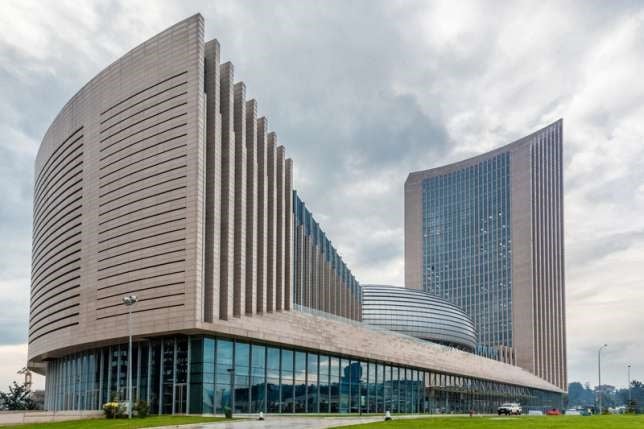
Unless regional bodies, such as the AU, show leadership to dismantle patriarchy and usher in women leaders, the countries which they serve will not work to dismantle patriarchy either, writes Nonsikelelo Ncube.
The African Union (AU) stands divided as Israel has been granted observer status in the continental body with angry outbursts and finger-pointing over their treatment of Palestinians.
While that debate rages, African leaders seem to agree about another hot-button issue: the role of women in the organisation.
Only two women are serving on the Board of the AU, out of a total of ten members. African leaders appear united in having a limited number of women leaders in the organisation. I realised this during my visit in 2019 to AU headquarters in the Ethiopian capital Addis Ababa. I could literally play a 'spot the woman' game down the hallways and meeting rooms of the AU, keeping score as I went.
The organisation mirrors the continent's burden of patriarchy. Ironically, African women are in the majority. Data shows that just over 46% of sub-Saharan women make up the continent's labour force, showing there is no shortage of qualified and capable women to have a seat at the table. So the stark reality of gender disparity in the AU organisation was indeed troublesome.
Only four women presidents in Africa
African feminist writer Bibi Bakare-Yusuf highlights that in African contexts, patriarchy refers to the organisation of social life and institutional structures in which men have ultimate control over most aspects of women's lives and actions.
Men head many households, and male children are often groomed to take over the reins from day one. Frequently, men have the final say in the decision-making process, and women have very little to no say at all, even on matters that affect their autonomy. These gender roles and power formations are also the case in the African political arena.
Only four of the 54 African countries have female presidents, namely Ethiopia, Gabon, Togo and Tanzania. This is a paltry 7% demonstrating the gross levels of exclusion that women face. Women are quite often excluded from participating in politics at a local, national and regional level.
Nkosazana Dlamini-Zuma became the first woman to chair AU the AU and was not "missed" when her tenure ended in 2017. While her capability and decision-making while serving in the AU may be debated, Dlamini-Zuma faced heavy scrutiny, labelled as a leader "out to lunch or blissfully missing in action".
African politics is deemed to be too mucky a game for women. Yet Article IX of the Protocol to the African Charter on Human and People's Rights on the Rights of Women in Africa, widely known as the Maputo Protocol, articulates the right to participation in the political and decision-making process of women.
I find it ironic that this instrument which was adopted nearly two decades ago, has not been practised in the very structure that passed it as policy. How then do these articulations permeate through to the rest of the continent if they are not practised at the highest level?
Rise of formidable women
Over the decades, we have witnessed the rise of many formidable women who, given a chance, would infuse the much-needed new perspectives in African politics. Young women such as Lindiwe Mazibuko of South Africa and Fadzayi Mahere of Zimbabwe have stepped up to participate in national politics. They undoubtedly have been met with various obstacles, such as arbitrary online abuse. Mahere was randomly labelled a "gold digger" by a Twitter user for example.
Mazibuko and Mahere face a double-edged sword in the form of their youth and gender. Men are quick to dismiss women as being too emotional to participate effectively in decision-making processes, particularly in politics. This couldn't be further from the truth. Women have successfully steered the ships when they have been entrusted with the highest positions.
If the hypothesis is that women are not effective political leaders, then Ellen Johnson Sirleaf, Joyce Hilda Banda and Ngozi Okonjo-Iweala disprove that preconception.
Africa is plagued by different wars and conflicts mainly due to poor governance and has been dubbed a dark continent. While we are certainly not a dark continent, the systemic exclusion of women from power structures casts a dark cloud on our political landscape. Women have played a crucial role in the liberation struggles across the continent, yet their male comrades have dominated post-colonial Africa. The main form of participation afforded by women in African politics appears to rest on their ability to provide much-needed votes for male candidates.
Gendered exclusionary nature of African politics
The gendered exclusionary nature of African politics has rendered women mere spectators in electoral and governance processes, limiting their voices in the decision processes that very much affect them.
It is high time that Africa recognises the indomitable force that women are and the much-needed leadership change they can bring about in the local, regional, and global arena. Regional and continental bodies such as the AU must pave the way for the integration of women into its structure, creating a ripple effect that will trickle into the continent at large.
Unless regional bodies show leadership to dismantle patriarchy and usher in women leaders, the countries which they serve will not work to dismantle patriarchy either, leaving women marginalised, looking in from the fringes.
- Nonsikelelo Ncube is an Executive Assistant at the Centre for the Study of Violence and Reconciliation.
To receive Opinions Weekly, sign up for the newsletter here.
*Want to respond to the columnist? Send your letter or article to opinions@news24.com with your name and town or province. You are welcome to also send a profile picture. We encourage a diversity of voices and views in our readers' submissions and reserve the right not to publish any and all submissions received.
Disclaimer: News24 encourages freedom of speech and the expression of diverse views. The views of columnists published on News24 are therefore their own and do not necessarily represent the views of News24.




 Publications
Publications
 Partners
Partners























